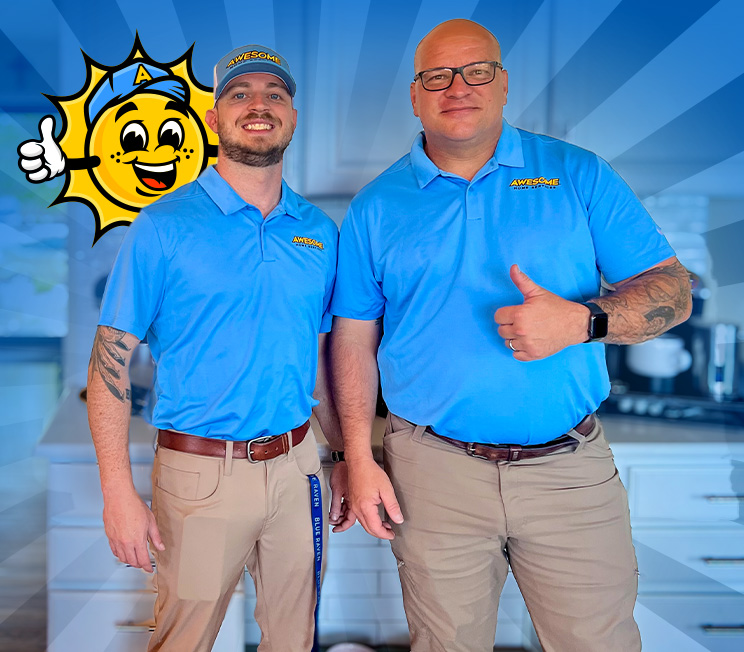
Furnace Repair & Installation in Colorado Springs, CO
24/7 Emergency Furnace Services Are Available
Your furnace is an essential part of your home, serving as the main source of heat during Colorado’s colder months. Like any mechanical system, furnaces do not last forever, and they can experience malfunctions that affect performance. If your furnace is not performing as well as it used to, you may need to contact us for furnace repair or replacement services in Colorado Springs.
At Awesome Home Services, our team of certified HVAC technicians brings extensive knowledge and experience to every job, whether it involves routine maintenance, complex repairs, or complete furnace replacements. When your furnace is struggling or fails entirely, we can quickly diagnose and fix the underlying problem. If your furnace is past its prime, we’ll inform you and provide honest advice on upgrades and replacements. Plus, we offer 24/7 service, so we are ready to respond if your furnace stops supplying heat when you need it most.
Call (719) 350-3917 for professional furnace repair or installation services in Colorado Springs, CO.
What Are the Most Common Furnace Issues Residents in Colorado Springs Encounter?
Even with consistent maintenance, furnaces are prone to occasional problems that may require professional repairs. Our trained technicians are equipped to handle a wide range of furnace issues.
Our Colorado Springs furnace services include expert assistance with many common repairs, including those involving:
- Thermostat malfunctions. The thermostat controls the temperature set-point for the furnace, and any inaccuracies can lead to inconsistent heating. Our technicians are skilled in recalibrating and replacing faulty thermostats to restore proper temperature regulation and comfort.
- Ignition system issues. Modern furnaces typically use an electronic ignition system that can occasionally fail and cause a furnace to stop functioning. We can diagnose ignition problems – whether they stem from a faulty igniter or an electrical issue – and perform the necessary repairs to get the furnace running smoothly again.
- Blower motor problems. The blower motor is responsible for circulating warm air throughout a home. When it malfunctions, it can result in little to no airflow. Our team can repair or replace defective motors.
- Dirty or clogged filters. Filters help maintain air quality and furnace efficiency. Over time, they can become clogged with dust and debris, restricting airflow. We offer routine filter cleaning and replacement services to maintain optimal airflow and furnace performance.
- Frequent cycling or short cycling. If a furnace cycles on and off too frequently, it may indicate underlying issues like an oversized unit, restricted airflow, or thermostat problems. Our technicians can diagnose the root causes and resolve them to promote consistent operation and prevent excessive wear on the system.
- Ductwork leaks. Leaks or blockages in the ductwork can impede the efficiency of a furnace, leading to uneven heating and increased energy costs. We can assess and repair ductwork issues, seal leaks, and facilitate proper airflow throughout a home.
What Size Furnace Do I Need for My Home in Colorado Springs?
Selecting the appropriate size furnace for your home in Colorado Springs is essential for achieving optimal efficiency and comfort. Proper sizing ensures that your furnace can adequately heat your living space without overworking itself, which could lead to premature wear and increased energy costs.
Several factors will determine the size of the furnace your home needs:
- Home square footage. The most basic consideration is the total square footage of your home. Larger spaces require more heating power to maintain a consistent temperature. The general rule of thumb is about 30-60 BTUs (British Thermal Units) per square foot, but this can vary based on factors like climate and home insulation.
- Climate. Homes in colder regions like Colorado demand furnaces with higher BTU ratings to compensate for severe temperature drops, whereas those in milder climates may need lower BTU capacities.
- Insulation & Energy Efficiency. Well-insulated homes retain heat better and consequently demand less heating power. Factors like window quality, door seals, and attic or wall insulation will impact the size of the furnace you require. Energy-efficient homes can use smaller, more efficient furnaces without sacrificing comfort.
- Home layout & design. The design of your home, including ceiling height and the number of rooms or floors, impacts airflow and heating needs. Homes with high ceilings or numerous levels might need a slightly larger system to deliver even distribution of heat.
- Ductwork & Ventilation. The condition and layout of your home's ductwork can influence furnace choice. Efficient ducts require less heating power, while older or poorly designed systems may necessitate a furnace with a higher BTU to compensate for heat loss during circulation.
Consulting with an HVAC professional is invaluable when determining the best furnace size for your home. They can perform a detailed assessment of your property, considering specific characteristics unique to Colorado homes, to ensure you select a furnace that efficiently meets your heating demands. Additionally, using load calculation software helps in pinpointing exact energy requirements, supporting a more precise furnace selection process.
How Long Do Furnaces Typically Last in Colorado?
In Colorado, the typical lifespan of a furnace ranges from 15 to 20 years, although several factors can influence this duration. The climate plays a significant role, as furnaces in colder regions like Colorado may experience more frequent use, potentially leading to faster wear and tear.
Regular maintenance is crucial for prolonging the life of your furnace, as it helps keep your system running efficiently and reduces the likelihood of significant issues developing. The quality of the furnace itself is also a determining factor, as higher-end models may last longer due to superior construction and more robust components. It’s important to monitor your unit’s performance over time, watching for any signs of declining efficiency or frequent repairs that may indicate the need for a replacement is on the horizon.
For homeowners looking to maximize their investment, upgrading insulation and sealing air leaks can enhance furnace efficiency and longevity. Routine inspections by qualified HVAC technicians can pinpoint potential issues before they escalate, ensuring your furnace operates optimally throughout its lifespan. Homeowners should also consider investing in high-efficiency models that utilize the latest technology to reduce energy consumption and improve indoor comfort.
Understanding Furnace Speeds & Fuel Types
If you are looking to upgrade or replace your furnace, you will need to consider its operating speed and fuel type. These decisions will impact your overall comfort, indoor air quality, and installation cost, among other things.
Several furnace speeds are available:
- Single-stage furnaces. These furnaces operate with a single, fixed speed and always run at full capacity. While they are generally more affordable upfront, their lack of adaptability means they may consume more energy than necessary and can lead to uneven temperature regulation throughout the home.
- Two-stage furnaces. With two distinct speeds, these units offer more efficiency and comfort than single-stage models. They can operate at a lower speed to maintain a consistent temperature, switching to full capacity only when more heating is required. This ability to modulate helps improve energy efficiency and even temperature distribution. Two-stage furnaces also tend to be much quieter than single-stage models.
- Variable-speed furnaces. Variable-speed furnaces are the most advanced option and can adjust their blower motor speed incrementally to provide precise temperature control. By running continuously at lower speeds, these furnaces are designed to deliver exceptionally consistent warmth and are highly energy-efficient, although they come at a higher cost.
Choosing the right fuel type for your furnace is equally important and can impact long-term costs and environmental considerations. Natural gas furnaces are often preferred due to their efficiency and lower cost, particularly in areas where gas is accessible. However, oil furnaces can be a powerful alternative, especially in regions without natural gas infrastructure. Electric furnaces, while costlier to run, offer a clean energy option and are simpler in terms of installation and maintenance, making them viable in certain scenarios.
Furnaces can also run on one of several fuel types:
- Natural gas furnaces. These furnaces connect to existing gas lines, providing a reliable and consistent heating source. They are typically the most economical choice when natural gas is readily accessible, so if your home has access to a natural gas line, we generally recommend this option.
- Oil furnaces. Oil furnaces are known for their strong heat output and durability and can be used when a home doesn’t have access to a natural gas line. However, they require regular maintenance, fuel deliveries, and a storage tank for your oil, which can add to overall costs.
- Electric furnaces. While often more expensive to run due to electricity costs, electric furnaces can sometimes be a good option if natural gas or oil models are not feasible. Keep in mind that an electric furnace will likely take longer to heat your home, so you should consider installing a gas or oil furnace whenever possible.
Whichever fuel type you choose, it’s vital to consider both upfront installation costs and long-term expenses, ensuring you select a system that aligns with your financial and environmental goals. Modern electronic ignition systems can further enhance efficiency in all types of fuel-based furnaces.


What is the Awesome Difference?
-
Effective & Informative CommunicationKeeping you informed every step of the way with clear, honest, and effective communication you can trust.
-
Service With Integrity
Striving to be your whole-home service expert, we specialize in HVAC, plumbing, electrical and garage door services.
-
Employee EmpowermentWe create opportunities and a supportive environment for our team, fostering growth and professional development.
-
Locally Owned & OperatedWe are passionate about the cities we operate in and are dedicated to contributing positively to this great community.
What Our Customers Are Saying
-
It was an all around awesome experience!"
I will use Awesome Home Services again and would highly recommend them to others. I would also like to add the receptionist I spoke with who helped make my appointment made an excellent first impression.
"- Jill S. -
I was extremely pleased with the whole process."I called on a Monday to make an appointment. They came over that afternoon, priced the job, picked up parts, and completed the job later the same day."- Bill F.
-
Prompt, Friendly, & Knowledgeable"Brantley & Robby were excellent in assisting at my father's home. They were prompt, friendly, honest, and knowledgeable. I would definitely recommend Awesome Home Services and request Brantley/Robby."- Maria B.
-
Thank you, Kyle!"Kyle was extremely timely since we had an emergency leak late at night. He coordinated with the city and repaired the leak as fast as possible. Excellent service and very polite."- Dillon A.
-
Saved Me From the Cold"The service was GREAT! He was very professional, mindful of the home, had a highly positive attitude, and was very open to explaining what the problem was as he was troubleshooting and fixing the system in front of me."- Kevin F.
-
Above & Beyond"I’m so glad we found Awesome Home Services. On Wednesday, Elliot came out to do our annual furnace inspection and tune-up. He went above and beyond for our family."- Jillian K.
-
Awesome Home Service was great."The technical Craig resolved our blocked sewer line quickly. He was polite and professional. Would recommend this business and the price was reasonable."- Greg T.
-
Absolutely pleased with the job done!!"Clay and Tristen are very professional and fast getting my water problems solved!! Water heater was installed very professionally!! Will recommend to everyone!!"- Michelle S.

Don’t Miss Out on These Awesome Opportunities!







